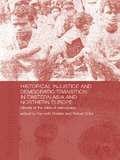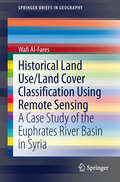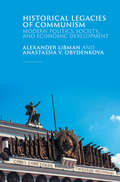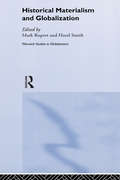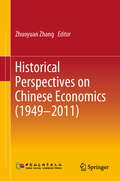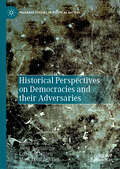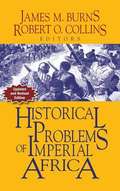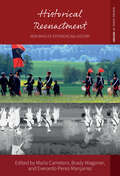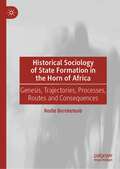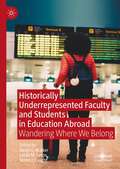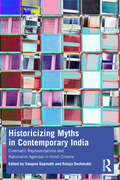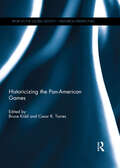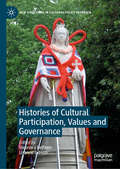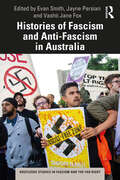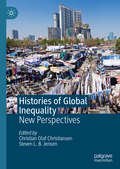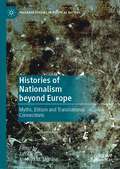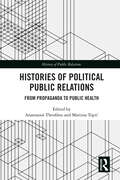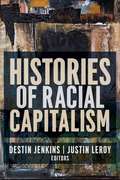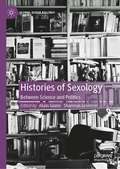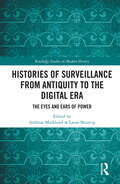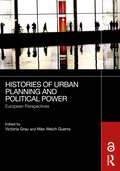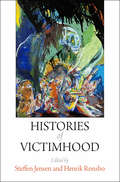- Table View
- List View
Historical Injustice and Democratic Transition in Eastern Asia and Northern Europe: Ghosts at the Table of Democracy
by Robert Cribb Kenneth ChristieThe memory of past atrocity lingers like a ghost at the table of democracy. Injustices carried out in the past - from massacres and murder to repression and detention - embitter societies and distort their structures so that the process of establishing and running a democracy carries an extra burden. This volume examines societies at various stages of dealing with the memory of the past, from China, Mongolia, Indonesia and the Baltic States, where bitter memories of death and persecution still intrude, to Finland, where the civil war of 1918 has finally been accepted as a distant national tragedy.
Historical Land Use/Land Cover Classification Using Remote Sensing: A Case Study of the Euphrates River Basin in Syria
by Wafi Al-FaresAlthough the development of remote sensing techniques focuses greatly on construction of new sensors with higher spatial and spectral resolution, it is advisable to also use data of older sensors (especially, the LANDSAT-mission) when the historical mapping of land use/land cover and monitoring of their dynamics are needed. Using data from LANDSAT missions as well as from Terra (ASTER) Sensors, the authors shows in his book maps of historical land cover changes with a focus on agricultural irrigation projects. The kernel of this study was whether, how and to what extent applying the various remotely sensed data that were used here, would be an effective approach to classify the historical and current land use/land cover, to monitor the dynamics of land use/land cover during the last four decades, to map the development of the irrigation areas, and to classify the major strategic winter- and summer-irrigated agricultural crops in the study area of the Euphrates River Basin.
Historical Legacies of Communism in Russia and Eastern Europe
by Stephen Kotkin Mark R. BeissingerThis book takes stock of arguments about the historical legacies of communism that have become common within the study of Russia and East Europe more than two decades after communism's demise and elaborates an empirical approach to the study of historical legacies revolving around relationships and mechanisms rather than correlation and outward similarities. Eleven essays by a distinguished group of scholars assess whether post-communist developments in specific areas continue to be shaped by the experience of communism or, alternatively, by fundamental divergences produced before or after communism. Chapters deal with the variable impact of the communist experience on post-communist societies in such areas as regime trajectories and democratic political values; patterns of regional and sectoral economic development; property ownership within the energy sector; the functioning of the executive branch of government, the police, and courts; the relationship of religion to the state; government language policies; and informal relationships and practices.
Historical Legacies of Communism: Modern Politics, Society, and Economic Development
by Alexander Libman Anastassia V. ObydenkovaLibman and Obydenkova reveal how legacies of the Communist Party of the Soviet Union (CPSU) have survived in the politics, economic development, culture, and society of post-Communist regions in the 21st Century. The authors show how this impact is not driven by Communist ideology but by the clientelistic practices, opportunism and cynicism prevalent in the CPSU. Their study is built on a novel dataset of the CPSU membership rates in Russian regions in the 1950s-1980s, alongside case studies, interviews and an analysis of mass media previously only available in Russian and discussed here in English for the first time. It will appeal to students and scholars of Russian and Eastern European politics and history, and anyone who wants to better understand countries which live or have lived through Communism: from Eastern Europe to China and East Asian Communist states.
Historical Materialism and Globalisation: Essays on Continuity and Change (Routledge Studies in Globalisation)
by Hazel Smith Mark RupertNow that Soviet style socialism has collapsed upon itself and liberal capitalism offers itself as the natural, necessary and absolute condition of human social life on a worldwide scale, this book insists that the potentially emancipatory resources of a renewed, and perhaps reconstructed, historical materialism are more relevant in today's world than ever before. Rather than viewing global capitalism as an eluctable natural force, these essays seek to show how a dialectic of power and resistance is at work in the contemporary global political economy, producing and contesting new realities and creating conditions in which new forms of collective self determination become thinkable and materially possible. It will be vital, topical reading for anyone interested in international relations, international political economy, sociology and political theory.
Historical Perspectives on Chinese Economics (1949–2011)
by Zhuoyuan ZhangThe book summarizes the 60 year development of economic theories, explaining in detail the features and development of economic theories from 1949 to 1976 and in the reform and opening-up period. The author has made a systematic theoretical analysis on the economic situation from two different stages — before and after China's reform and opening-up, which put forward many unconventional point of view, and it has contributed visionary ideas for the research on China's economy. It provide the readers with a general understanding of the economic trend and development of contemporary China, with many pertinent answer to the practical and concrete problems about China's economy.
Historical Perspectives on Democracies and their Adversaries (Palgrave Studies in Political History)
by Joost Augusteijn Constant Hijzen Mark Leon de VriesThis book historicizes the debate over how democratic regimes deal with anti-democratic groupings in society. Democracies across the world increasingly find themselves under threat from enemies, ranging from terrorists to parties and movements that undermine democratic institutions from within. This compilation of essays provides the first historical exploration of how democracies have dealt with such anti-democratic forces in their midst and how this impacted upon what democracy meant to all involved. From its inception in the nineteenth century, modern democratic politics has included fundamental debates over whether it is undemocratic and dangerous to ban parties with anti-democratic objectives and whether democracies should defend themselves, if necessary with violence, against perceived anti-democratic forces. This volume shows that implicit conceptions of democracy and democratic repertoires become explicit, fluid, and contested throughout these confrontations, not only within democratic parties, but also among their adversaries. Both sides have, at times, used force or limited the expression of ideas, thus blurring the lines between who is democratic and who is not.
Historical Problems Of Imperial Africa
by Robert O. Collins James M. BurnsThis book is designed to inform, engage, and stimulate discussions among its readers. Collins and his collaborators have included authoritative statements and analysis by renowned scholars. A distinctive characteristic of the whole anthology is the range of interpretations of classic and recent research. The book offers a full spectrum of emotionally charged theories. Each section presents a set of conflicting arguments to show the state of debates on these highly controversial issues. Extensive commentary by the editors leads the reader through this treasury of theories and dramatically highlights the development of the field.
Historical Reenactment: New Ways of Experiencing History (Making Sense of History #44)
by Mario Carretero, Brady Wagoner, and Everardo Perez-ManjarrezLong dismissed as the domain of hobbyists and obsessives, historical reenactment—the dramatization of past events using costumed actors and historical props—has only in recent years attracted serious attention from scholars. Drawing on examples from around the world, Historical Reenactment offers a fascinating, interdisciplinary exploration of this cultural phenomenon. With particular attention to reenactment’s social and pedagogical dimensions, it develops a robust definition of what the practice constitutes, considers what methodological approaches are most appropriate, and places it alongside museums and memorial sites as an object of analysis.
Historical Sociology of State Formation in the Horn of Africa: Genesis, Trajectories, Processes, Routes and Consequences
by Redie BereketeabThis book analyses the historical sociology of state formation in the Horn of Africa. It examines the genesis, trajectories, processes, routes and consequences of the evolution of state formation. Three analytical and explanatory models explain the process of state formation in the HOA: proto-state, colonial and national liberation. The models, heuristically and innovatively, provide understanding, interpretation and analysis of state formation. While the proto-state model explicates an indigenous historical process of state formation, the colonial model refers to an externally designed and imposed process of state formation. The national liberation model concern state formation conducted under liberation movement and ideology. The distinct significance of these models is that collectively they generate sufficient analysis of state formation. They are also unique in that they have never been employed as aggregate analytical and explicative instruments to address the predicament of state formation in the Horn of Africa.
Historical and Multicultural Encyclopedia of Women's Reproductive Rights in the United States
by Judith A. BaerMany brief articles about womens reproductive rights in the U.S.
Historically Underrepresented Faculty and Students in Education Abroad: Wandering Where We Belong
by Devin L. Walker Linda M. Lyons Seneca VaughtThis book examines how the unique perspectives of BIPOC faculty and students must be integrated into the undergraduate curriculum to expose students of color to education abroad experiences, enhance cultural awareness and sensitivity, and lend to a broader diversity and inclusion perspective. This edited volume, written by authors of color, argues that education abroad programs not only provide essential academic and cultural enrichment but can also be an important nexus of innovation. When approached within a creative, interdisciplinary, and holistic framework, these programs are ripe with opportunities to engage various constituencies and a potent source of strategies for bolstering diversity, recruitment, retention, and graduation. Despite a tendency to view study abroad as a luxurious option for persons with wealth and means, the editors and their authors argue that global education should be thought of as a fundamental and integral part of higher education, for all students, in a global era.
Historicism and Fascism in Modern Italy
by David D. RobertsDuring the early decades of the twentieth century, Italy produced distinctive innovations in both the intellectual and political realms. On the one hand, Benedetto Croce (1866-1952) and Giovanni Gentile (1875-1944) spearheaded a radical rethinking of historicism and philosophical idealism that significantly reoriented Italian culture. On the other hand, the period witnessed the first rumblings of fascism. Assuming opposite sides, Gentile became the semi-official philosopher of fascism while Croce argued for a renewed liberalism based on 'absolute' historicism.In Historicism and Fascism in Modern Italy, David D. Roberts uses the ideological conflict between Croce and Gentile as a basis for a wider discussion of the interplay between politics and ideas in Italy during the early-twentieth century. Roberts examines the connection between fascism and the modern Italian intellectual tradition, arguing that the relationship not only deepens our understanding of fascism and liberalism but also illuminates ongoing dangers and possibilities in the wider Western world. This set of twelve essays by one of the leading scholars in the field represents an authoritative view of the modern Italian intellectual tradition, its relationship with fascism, and its enduring implications for history, politics, and culture in Italy and beyond.
Historicizing Myths in Contemporary India: Cinematic Representations and Nationalist Agendas in Hindi Cinema
by Swapna Gopinath Rutuja DeshmukhThis book examines cinematic practices in Bollywood as narratives that assist in shaping the imagination of the age, especially in contemporary India. It examines historical films released in India since the new millennium and analyses cinema as a reflection of the changing socio-political and economic conditions at any given period. The chapters in Historicizing Myths in Contemporary India: Cinematic Representations and Nationalist Agendas in Hindi Cinemas also illuminate different perspectives on how cinematic historical representations follow political patterns and market compulsions, giving precedence to a certain past over the other, creating a narrative suited for the dominant narrative of the present. From Mughal-e-Azam to Padmaavat, and Bajirao Mastani to Raazi, the chapters show how creating history out of myths validate hegemonic identities in a rapidly evolving Indian society. The volume will be of interest to scholars of film and media studies, literature and culture studies, and South Asian studies.
Historicizing the Pan-American Games (Sport in the Global Society - Historical Perspectives)
by Bruce Kidd and Cesar R. TorresThe Pan-American Games, begun officially in 1951 in Buenos Aires and held in every region of the western hemisphere, have become one of the largest multi-sport games in the world. 6,132 athletes from 41 countries competed in 48 sports in the 2015 Games in Toronto, Canada. The Games are simultaneously an avenue for the spread of the Olympic Movement across the Americas, a stage for competing ideologies of Pan-American unity, and an occasion for host city infrastructural stimulus and economic development. And yet until this volume, the Games have never been studied as a single entity from a scholarly viewpoint. Historicizing the Pan-American Games presents 12 original articles on the Games. Topics range from the origins of the Games in the period between the world wars, to their urban, hemispheric and cultural legacies, to the policy implications of specific Games for international sport. The entire collection is set against the shifting economic, social, political, cultural, sporting and artistic contexts of the turbulent western hemisphere. Historicizing the Pan-American Games makes a significant contribution to the literature on major games, Olympic sport and sport in the western hemisphere. This book was previously published as a special issue of The International Journal of the History of Sport.
Histories of Cultural Participation, Values and Governance (New Directions in Cultural Policy Research)
by Eleonora Belfiore Lisanne GibsonThis book develops the first integrated, critical-historical examination of the terms, narratives and assumptions constructing present day notions of participation and value, and the relations between them. Histories of Cultural Participation, Values and Governance proposes a radical re-evaluation of these relationships, organized in two inter-related sections, on political discourses of participation and value, and on culture and governance. The essays collected here provide an in-depth historical understanding of the development of definitions, assumptions and beliefs around the nature and value of cultural participation, their place in contemporary cultural governance and exploitation in local socio-economic development strategies. They also bring a novel perspective to current policy, practice and scholarly debates on the connections between culture, place-making and the creative economy. As such, the essays provide vital historical insight that sheds light on contemporary issues of cultural participation, value and governance.
Histories of Fascism and Anti-Fascism in Australia (Routledge Studies in Fascism and the Far Right)
by Evan Smith Jayne Persian Vashti Jane FoxHistories of Fascism and Anti-Fascism in Australia provides a history of fascist movements and anti-fascist resistance in Australia over the past century.In recent years, the far right has become a resurgent force across the globe, resulting in populist parties securing electoral victories, social movements organising on the streets, and acts of right-wing terrorism. Australia has not been immune to this. However, this is not merely a recent phenomenon; it has a long history of fascist and far-right groups and individuals. These groups have attempted to situate themselves within the wider settler colonial political landscape, often portraying themselves as the inheritors of a violent and exclusionary colonial past. Concurrently, these groups have linked into globalised anti-communist and white supremacist networks. At the same time, Australia has often seen resistance to fascism and the far right, from the political centre to the far left. Covering the period from the 1920s to the present day, and featuring insights from historians, sociologists, and political scientists, this book provides the most detailed account of this fascinating and important topic. This book will be of interest to students and activists with an interest in the extreme right and anti-fascism as well as Australian history, politics, and society.
Histories of Global Inequality: New Perspectives
by Christian Olaf Christiansen Steven L. B. JensenThis book argues that inequality is not just about numbers, but is also about lived, historical experience. It supplements economic research and offers a comprehensive stocktaking of existing thinking on global inequality and its historical development. The book is interdisciplinary, drawing upon regional and national perspectives from around the world while seeking to capture the multidimensionality and multi-causality of global inequalities. Grappling with what economics offers – as well as its blind spots – the study focuses on some of today’s most relevant and pressing themes: discrimination and human rights, defences and critiques of inequality in history, decolonization, international organizations, gender theory, the history of quantification of inequality and the history of economic thought. The historical case studies featured respond to the need for wider historical research and to calls to examine global inequality in a more holistic manner.The Introduction 'Chapter 1 Histories of Global Inequality: Introduction' is open access under a CC BY 4.0 license via link.springer.com.
Histories of Nationalism beyond Europe: Myths, Elitism and Transnational Connections (Palgrave Studies in Political History)
by Jan Záhořík Antonio M. MoroneThis edited collection explores varying shapes of nationalism in different regional and historical settings in order to analyse the important role that nationalism has played in shaping the contemporary world. Taking a global approach, the collection includes case studies from the Middle East, Africa, Asia and North America. Unique not only in its wide range of geographically diverse case studies, this book is also innovative due to its comparative approach that combines different perspectives on how nations have been understood and how they came into being, highlighting the transnational connections between various countries. The authors examine what is meant by the concepts of ‘nation’ and ‘national identity,’ discussing themes such as citizenship, ethnicity, historical symbols and the role of elites. By exploring these entangled categories of nationalism, the authors argue that throughout history, elites have created ‘artificial ’ versions of nationalism through symbolism and mythology, which has led to nationalism being understood through social constructivist or primordialist lenses. This diverse collection will appeal to researchers studying nationalism, including historians, political scientists and anthropologists.
Histories of Political Public Relations: From Propaganda to Public Health (The History of Public Relations)
by Anastasios Theofilou Martina TopićDespite strong arguments that have been exploring the influence of Public Relations (PR) on public information, propaganda, the development of nation branding and policy-making, there remains little research on the history of governmental PR. This has led to a limited understanding of the discipline that aligns it with a supportive role to wider marketing campaigns or with a stretch to political communication through lobbying.Responding to this challenge, this book explores PR’s historical connection to government communication. The editors assemble respected contributors to explore government PR through a series of micro-histories and also examine larger theoretical issues, including the relationship between PR and propaganda. The chapters explore behavioural aspects of government campaigning and the tools and techniques typically used. In the context of COVID-19 and global resistance to measures, while health and climate scientists warn that there might be more pandemics to come, looking at behavioural campaigning becomes even more relevant.This book will add knowledge and understanding to the fields of PR history and historiography. Academics and researchers will find the volume appropriate for research and teaching.
Histories of Racial Capitalism (Columbia Studies in the History of U.S. Capitalism)
by Jenkins, Destin; Leroy, JustinThe relationship between race and capitalism is one of the most enduring and controversial historical debates. The concept of racial capitalism offers a way out of this impasse. Racial capitalism is not simply a permutation, phase, or stage in the larger history of capitalism—since the beginning of the Atlantic slave trade and the colonization of the Americas, capitalism, in both material and ideological senses, has been racial, deriving social and economic value from racial classification and stratification. Although Cedric J. Robinson popularized the term, racial capitalism has remained undertheorized for nearly four decades.Histories of Racial Capitalism brings together for the first time distinguished and rising scholars to consider the utility of the concept across historical settings. These scholars offer dynamic accounts of the relationship between social relations of exploitation and the racial terms through which they were organized, justified, and contested. Deploying an eclectic array of methods, their works range from indigenous mortgage foreclosures to the legacies of Atlantic-world maroons, from imperial expansion in the continental United States and beyond to the racial politics of municipal debt in the New South, from the ethical complexities of Latinx banking to the postcolonial dilemmas of extraction in the Caribbean. Throughout, the contributors consider and challenge how some claims about the history and nature of capitalism are universalized while others remain marginalized. By theorizing and testing the concept of racial capitalism in different historical circumstances, this book shows its analytical and political power for today’s scholars and activists.
Histories of Sexology: Between Science and Politics (Global Queer Politics)
by Alain Giami Sharman LevinsonHistories of Sexology: Between Science and Politics takes an interdisciplinary and reflexive approach to the historiography of sexology. Drawing on an intellectual history perspective informed by recent developments in science and technology studies and political history of science, this book examines specific social, cultural, intellectual, scientific and political contexts that have given shape to theories of sexuality, but also to practices in medicine, psychology, education and sexology. Furthermore, it explores various ways that theories of sexuality have both informed and been produced by sexologies—as scientific and clinical discourses about sex—in Western countries since the 19th century.
Histories of Surveillance from Antiquity to the Digital Era: The Eyes and Ears of Power (Routledge Studies in Modern History)
by Andreas Marklund; Laura SkouvigDeploying empirical studies spanning from early Imperial China to the present day, 17 scholars from across the globe explore the history of surveillance with special attention to the mechanisms of power that impel the concept of surveillance in society. By delving into a broad range of historical periods and contexts, the book sheds new light on surveillance as a societal phenomenon, offering 10 in-depth, applied analyses that revolve around two main questions: • Who are the central actors in the history of surveillance? • What kinds of phenomena have been deemed eligible for surveillance, for example, information flows, political movements, border-crossing trade, interacting with foreign states, workplace relations, gender relations, andsexuality?
Histories of Urban Planning and Political Power: European Perspectives
by Victoria GrauUrban planning has always been a preeminent instrument of political power. In this volume, contributions from Europe and Latin America provide insight into the functions of planning under very different political and societal constellations over the last hundred years: dictatorships, parliamentary democracies, and illiberalism; capitalism and state socialism; state interventionism and neoliberalism; societies in times of peace and societies marked by colonial, civil, world, or cold wars.The dictatorships of the 1920s and 1930s made extensive use of the potential of planning for economic growth, for brutal repression, but also for the integration of certain population groups and as an effective means of propaganda. The legacy of these dictatorships still characterizes many European cities today and confronts planning with complex tasks. Dictatorial state socialism planned to establish a new social order with a particular technocratic rationality, which did not, however, cancel completely the tendential autonomy of the professional planning sphere. Parliamentary democracies and illiberal regimes have developed specific new practices of using planning to rebuild cities in the interests of neoliberal economic growth and populistic legitimization of power.Histories of Urban Planning and Political Power takes the next steps in significantly expanding our understanding of planning and politics. The book will be of interest to students and scholars of urbanism, urban/town planning, spatial planning, spatial politics, urban development, urban policies, and planning history and European history of the 20th century.The Open Access version of this book, available at http://www.taylorfrancis.com, has been made available under a Creative Commons Attribution-Non Commercial-No Derivatives (CC-BY-NC-ND) 4.0 license.
Histories of Victimhood (The Ethnography of Political Violence)
by Steffen Jensen Henrik RonsboThe word and concept of victim bear a heavy weight. To represent oneself or to be represented as a victim is often a first and vital step toward having one's suffering and one's claims to rights socially and legally recognized. Yet to name oneself or be called a victim is a risky claim, and social scientists must struggle to avoid erasing either survivors' experience of suffering or their agency and resourcefulness. Histories of Victimhood engages with this dilemma, asking how one may recognize and acknowledge suffering without essentializing affected communities and individuals.This volume tackles the theoretical and empirical questions surrounding the ways victims and victimhood are constructed, represented, and managed by state and nonstate actors. Geographically broad, the twelve essays in this volume trace histories of victimhood in Colombia, India, South Africa, Guatemala, Angola, Sierra Leone, Turkey, Occupied Palestine, Denmark, and Britain. They examine the implications of victimhood in a wide range of contexts, including violent occupations, displacement, war, reparation projects, refugee assistance, HIV treatment, trauma intervention, social welfare projects, and state formation. In exploring varying forms of hardship and identifying what people do to survive, how they make sense of their own suffering, and how they are frequently either acted upon or ignored by humanitarian agencies and states, Histories of Victimhood encourages us to see victimhood not as a definite and definable category of experience but as a changeable and culturally contingent state.Contributors: Sofie Danneskiold-Samsøe, Pamila Gupta, Ravinder Kaur, Stine Finne Jakobsen, Andrew M. Jefferson, Steffen Jensen, Tobias Kelly, Frédéric Le Marcis, Walter Paniagua, Elizabeth A. Povinelli, Darius Rejali, Henrik Ronsbo, Lotte Buch Segal, Nerina Weiss.
